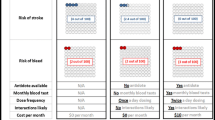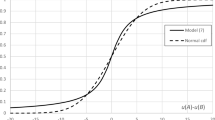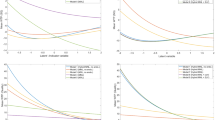Abstract
A substantial part of the discrete choice model literature has been concerned with specifications accounting for preference heterogeneity. In contrast, only a few studies have been interested in the presence of income effect, and it is much rarer still to come across models trying to account for both effects simultaneously. In this paper we use a specification that accounts for income effect and preference heterogeneity, both of a systematic and of a random nature. Our results point out that care should be taken with conclusions drawn from studies that only consider these effects separately, since they can be confounding from an empirical point of view. In fact, we provide empirical evidence that a random cost parameter can account for the existence of income effect.
Similar content being viewed by others
References
Amador FJ, González RM, Ortúzar JdeD (2005) Preference heterogeneity and willingness to pay for travel time savings. Transportation 32:627–647
Bates JJ (1987) Measuring travel time values with a discrete choice model: a note. Econ J 97:493–498
Bhat CR (1998) Accommodating variations in responsiveness to level-of-service measures in travel mode choice modeling. Transp Res 32A:495–507
Carrasco JA, Ortúzar JdeD (2002) Review and assessment of the nested logit model. Econ J 22:197–218
Cherchi E, Ortúzar JdeD (2003a) Multimodal choice models with mixed RP/SP data: correlation, non-linearities and income effect. Selected proceedings of the 9th World Conference on Transport Research. Pergamon, Amsterdam
Cherchi E, Ortúzar JdeD (2003b) Alternative specific variables in non-linear utility functions: influence of correlation, homoscedasticity and taste variations. 10th International Conference on Travel Behaviour Research, Lucerne, Switzerland
Cherchi E, Ortúzar JdeD (2005) Estimation and prediction with the mixed logit model: analysis of some confounding effects. Actas XII Congreso Chileno de Ingeniería del Transporte, Valparaíso
Cherchi E, Ortúzar JdeD (2006) Using mixed RP/SP models with non-linear effects in forecasting. Transp Res Rec 1977:27–34
Daly AJ (2004) Properties of random utility models of consumer choice. TraLog Conference, Molde, 2004
Gaudry MJI, Jara-Díaz SR, Ortúzar JdeD (1989) Value of time sensitivity to model specification. Transp Res 23B:151–158
Hensher DA, Greene WH (2003) The mixed logit model: the state of practice. Transportation 30:133–176
Herriges J, Kling C (1999) Nonlinear income effects in random utility models. Rev Econ Stat 81:62–72
Jara-Díaz SR, Farah M (1986) Transporte y Gasto Familiar en Sectores de Bajos Ingresos en Santiago. Actas IV Congreso Panamericano de Ingeniería de Tránsito y Transporte, Santiago
Jara-Díaz SR, Ortúzar JdeD (1989) Introducing the expenditure rate in the estimation of mode choice models. J Transp Econ Policy 23:293–308
Jara-Díaz SR, Videla J (1989) Detection of income effect in mode choice: theory and application. Transp Res 23B:393–400
Jara-Díaz SR, Guerra R (2003) On non-linearities in travel choice utility. European Transport Conference, Strasbourg
McFadden D (1999) Computing willingness-to-pay for transport improvements. In: Moore J, Riezman R, Melvin J (eds) Trade, theory and econometrics: essays in honour of John S. Chipman. Routledge, London
Munizaga MA, Alvarez-Daziano R (2005) Testing mixed logit and probit by simulation. Transp Res Rec 1921:53–62
Ortúzar JdeD, Donoso PCF (1983) Survey design, implementation, data coding and evaluation for the estimation of disaggregate choice models in Santiago de Chile. Second International Conference on New Survey Methods in Transport. Hungerford Hill Village, September 1983
Ortúzar JdeD, Ivelic AM (1987) Effects of using more accurately measured level-of-service variables on the specification and stability of mode choice models. Proceedings 15th PTRC Summer Annual Meeting, Bath University
Ortúzar JdeD, Willumsen LG (2001) Modelling transport, 3rd edn. Wiley, Chichester
Sillano M, Ortúzar JdeD (2005) Willingness to pay estimation with mixed logit models: some new evidence. Environ Plan 37A:525–550
Train KE (1998) Recreation demand models with taste differences over people. Land Econ 74:230–239
Train KE (2003) Discrete choice methods with simulation. Cambridge University Press, Cambridge
Williams HCWL (1977) On the formation of travel demand models and economic evaluation measures of user benefit. Environ Plan 9A:285–344
Author information
Authors and Affiliations
Corresponding author
Rights and permissions
About this article
Cite this article
Amador, F.J., González, R.M. & de Dios Ortúzar, J. On Confounding Preference Heterogeneity and Income Effect in Discrete Choice Models. Netw Spat Econ 8, 97–108 (2008). https://doi.org/10.1007/s11067-007-9043-6
Published:
Issue Date:
DOI: https://doi.org/10.1007/s11067-007-9043-6




